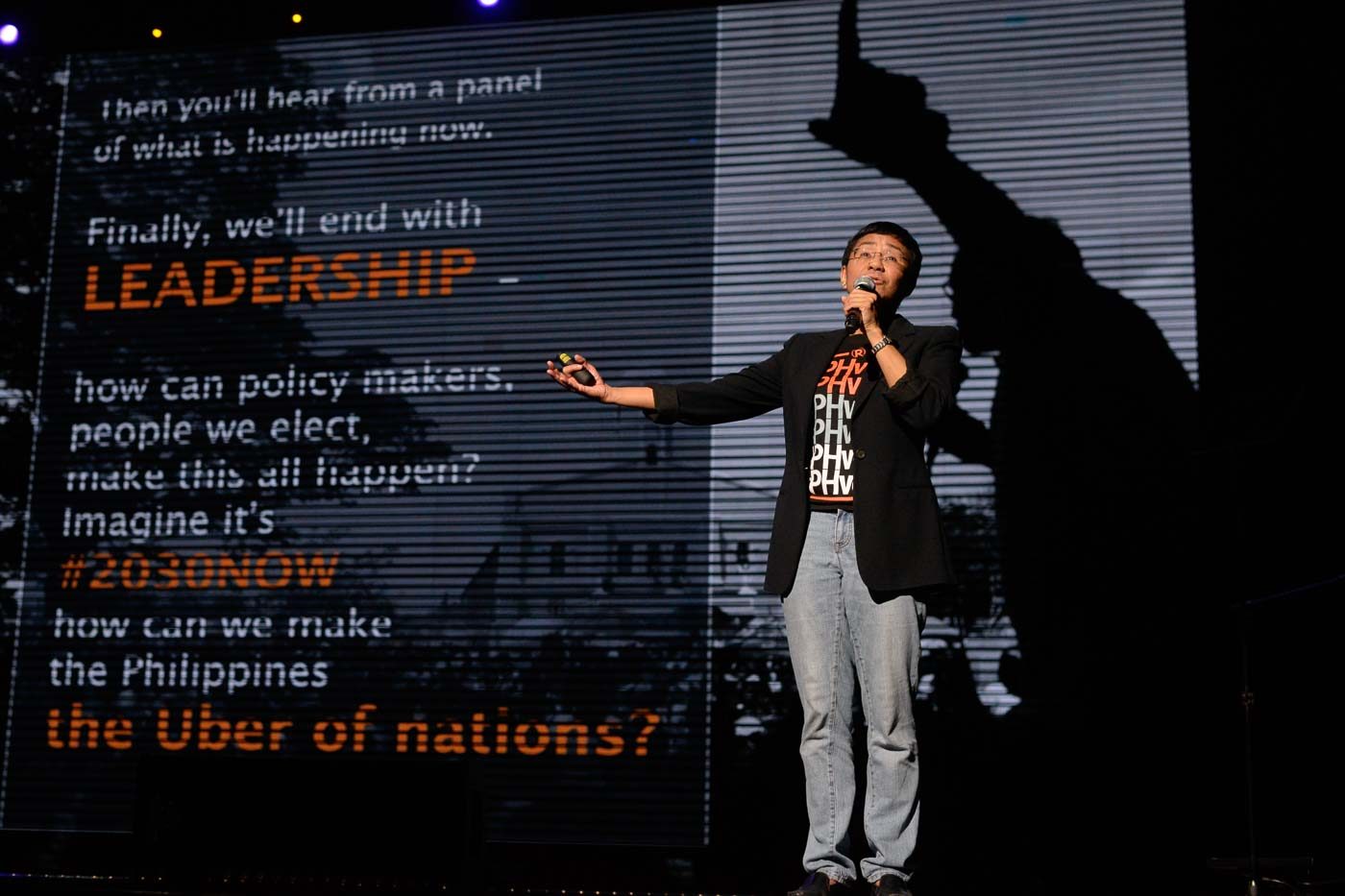SUMMARY
This is AI generated summarization, which may have errors. For context, always refer to the full article.

MANILA, Philippines – Global concerns like poverty reduction and improving disaster response may be difficult to address, but taking the first step is possible through technology and the power of a connected online community.
Rappler CEO Maria Ressa underscored the relationship between empowered netizens and their ability to make changes in society during a talk on technology and development at the 2015 Social Good Summit on Saturday, September 26.
The summit brings together leaders from various fields to discuss how technology can be harnessed to solve global problems and achieve millennium development goals.
In her talk, Ressa emphasized one mega trend among the online generation: the focus on individual empowerment.
Ressa said that each person has the potential to reduce poverty, improve healthcare, and solve other complex problems with the help of the Internet and social media.
“The first step is one person. One person has the idea to solve a problem. They build using the Internet or social media. Then you bring in your friends, your community, to solve that problem,” Ressa said.
Globally, only a third of the world’s population is connected online. Getting the other 4 billion people of the world’s population connected can bring in 140 million new jobs, lift 160 million out of poverty, and add $2.2 trillion to the world’s economy, Ressa said.
In the Philippines, Internet penetration rate is still poor – only about 40% of Filipinos have Internet access. But the good news is that Filipinos are active on social media, especially Facebook, and many own mobile phones.
Ressa said this opens up an avenue for improving Internet connectivity, which in turn will spur development.
“The more Internet access we have, it’ll spur development, because more of us can create more things, which would then increase our ability to create business…and it would start that cycle again,” she said.
Connectivity for social good
A connected community not only opens up global opportunities for employment and knowledge, it also plays a role in how citizens can interact with their leaders and influence government decisions.
Ressa cited how individual Filipinos used social media to kickstart campaigns and movements on issues close to their hearts.
In August 2013, thousands of Filipinos trooped to Rizal Park for #MillionPeopleMarch, which Ressa described as the “first Internet peer-to-peer-driven protest against corruption.”
These same Filipino netizens banded together to drum up awareness on disaster response during the first metrowide earthquake drill through #MMShakeDrill, which generated 2.1 billion impressions on Twitter.
It was also a social media campaign that raised awareness on the plight of one Filipina who was on death row in Indonesia, Ressa said, citing the successful #SaveMaryJane campaign that later became #MaryJaneLives.
Closer to home, Rappler’s own Project Agos platform addresses an issue that affects Filipinos every year: torrential rains, widespread flooding, and yearly typhoons.
Ressa said Project Agos helps streamline the disaster response process by connecting technology and rescue teams on the ground and tapping social media networks to disseminate information.
Big data and prediction
Social media, however, is not only a platform to react to pressing issues and force government to act. It can also be used to predict emergency scenarios and eventually improve disaster response.
“Despite the progress we have made, we’re very reactive…. What if we can pre-deploy our resources closer, so our response time is not in days or hours, but less?” This was the question posed by Mario Domingo, founder and managing partner of lloopp Natural Intelligence Solutions, in his talk on big data and social development.
To help cut response time, Domingo’s company can comb through data on Twitter, generate predictions, and deliver to responders a map of sites where emergencies may happen.
And if the predictions turn out false, it’s still an opportunity to continue refining the system to make it more accurate, he said.
But even with all the advances in technology, Domingo underscored the need not to focus on the technology itself, but on how it can be used to help people.
“My challenge: to build a smart nation that radically changes the world, save our resources, and provide direct benefits to our people,” he said. – Rappler.com
Add a comment
How does this make you feel?
There are no comments yet. Add your comment to start the conversation.